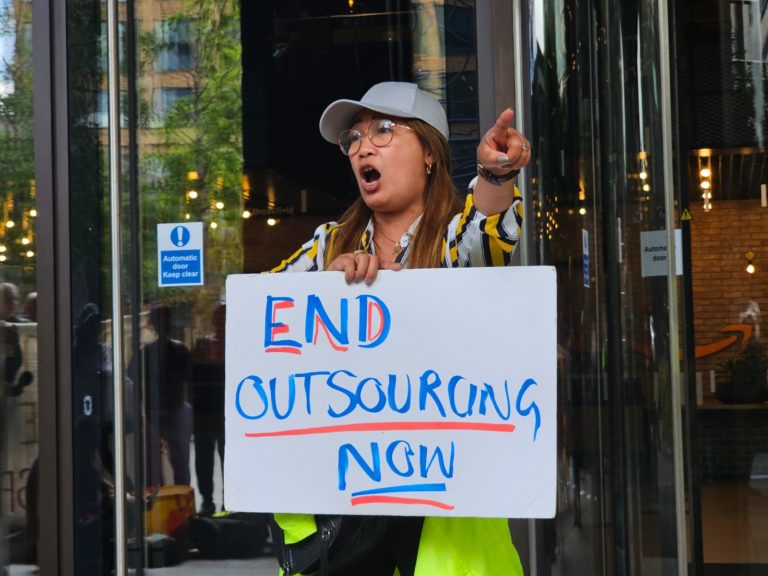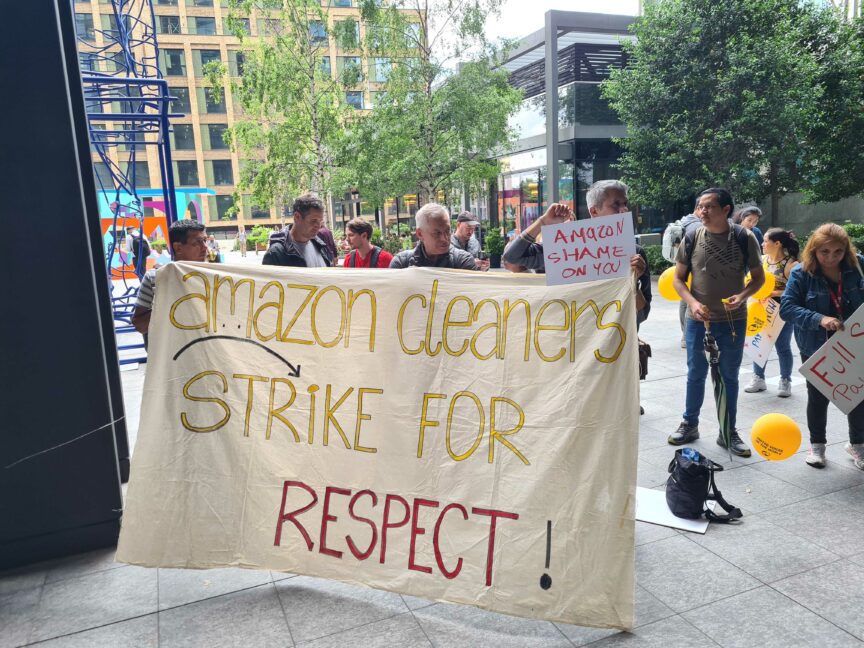Precarious, Low-Paid Migrant Workers Are Sick of Low Pay and Bad Conditions
'Invisible no more.'
by Simon Childs
4 July 2023

At Amazon’s UK headquarters in London on Tuesday, 20 June, some of the poorest workers in the UK were taking on one of the richest companies in the world. Workers employed by an outsourcing company to clean an Amazon delivery station in Erith, south-east London, were picketing with their trade union, the United Voices of the World (UVW), as part of a strike over their pay and working conditions.
The picket was part of a coordinated strike across eight places where UVW members work, including the Department for Education offices, the London School of Economics, ad agency Ogilvy, and a luxury apartment block in west London.
These are workers who come to offices after dark, when white-collar workers have gone home, and do the thankless work of making workplaces clean and safe. Hailed as essential during Covid, they are now treated as expendable. On the picket line, workers spoke of wanting “respect” and “dignity”; they wore T-shirts saying “invisible no more”.
Among the workers’ demands are pay rises: at the Amazon delivery station, workers are asking for an increase from minimum wage to the London living wage of £11.95 per hour; elsewhere, the union is demanding up to £15 an hour.
Addressing the picket in Spanish which was relayed in English by an interpreter, Franscisco, a worker at the Amazon delivery station, who gave only his first name, said: “We have had our hours cut. We have miserable poverty wages. And we know other companies pay more and they could afford more. But that’s what we’ve been left with in the midst of an economic crisis.
“During the pandemic we were important, as we still are now. We saved lives, we disinfected areas, we went around cleaning while we waited for the vaccine to come out.
“How can it be, one of the biggest, most powerful companies in the world, that makes billions of pounds, have us under these conditions?
“We’re not asking for much. All we’re asking for is to be treated with respect, to be left in peace not pressured like they’re pressuring us now, to be paid a living wage and to be treated with dignity and – that’s all.”
But as it fights for better conditions for its members, the union faces a merry-go-round of corporate buck-passing.
Not our problem.
In an email seen by Novara Media, facilities management outsourcing company Phosters – which Amazon contracts to clean its Erith delivery station – told UVW general secretary Petros Elia that it cannot pay workers the London living wage because “this has not been calculated into the contract cost with Amazon”.
“Without Amazon’s agreement to an increase in the cost of the contract (which we do not have),” Phosters added, “we are unable to agree to your members’ requests at this time.”
Speaking to Novara Media, Elia said the union has struggled even to make contact with Amazon. “Believe it or not, we’ve got no way to get a contact detail for someone direct to Amazon and so we’ve had to use the ‘Contact Us’ form on its website.” UVW has not heard back.
Phosters won’t sign off on a pay rise because Amazon haven’t agreed to pay it, but Amazon won’t take on the responsibility of an employer by answering to the workers’ chosen trade union. When Novara Media asked Amazon for a comment on the situation, a spokesperson said, “Have you spoken to Phosters? This is very much an issue between them and the union, not us.” Phosters did not reply to our request for comment.
This is outsourcing – the method the companies use to wash their hands of poor working conditions. (One demonstrator on the picket held a placard asking the pointed question, “Why pay us through [a] middle man?”)

“Each dispute is specific”, said Elia. “The most common approach is for the client to say ‘it’s got nothing to do with us. Whatever you’re asking for, it’s not our business, we don’t employ you directly. End of story’.
“Everyone knows it’s the client [who is ultimately responsible]. The contractor knows it’s the client, the employees know it’s the client, but outsourcing provides the client with a protective layer.”
There’s political support for this argument, too: at a picket at Streatham and Clapham High School in south London, the site of another UVW strike, local Labour MP Bell Ribeiro Addy said: “Don’t let the school tell you that they can do nothing about it, because there are a few things they can do. They pay the contractor. They can set some terms for the contractor that they give you decent wages – it’s that simple.”
Migrant workers make up 18% of the employed population in the UK and are more likely to work shifts, particularly night shifts, split shifts and weekends. They are also more likely to be in non-permanent jobs while working for minimum pay and in dismal conditions. Outsourcing is often the method used to enforce this. “We call it institutional racism”, said Elia.
UVW has made some inroads with this argument. In 2021 it won an employment tribunal against the Royal Parks in which it argued that the charity’s outsourcing constituted indirect discrimination. Almost 90% of in-house staff at the charity were white, while 90% of the outsourced cleaning staff were Black or from other ethnic minorities, and got worse pay, did not get full pay sick pay, and three times less maternity pay. The union hopes to have set a precedent that other Black and brown workers can use.
Small but mighty.
Back outside Amazon HQ, the picket was a raucous affair, with chants of “shame on Amazon”, vuvuzelas and a soundsystem blaring out music. Security guards locked the office doors, holding up white-collar Amazon workers as they returned from their lunch breaks.
The strike is numerically small, but Elia believes it is significant.
Elia said: “These are representatives of arguably the most important sections of the workforce that need to get organised. They are leading by example, albeit on a scale which needs to be significantly increased for it to start to bite.
“If the movement wants to talk about renewal and a revival, it’s going to have to be led by the private sector. It’s not possible to talk about union renewal mainly coming from the public sector, because they only represent [just under] 20% of the country’s workers.”
“If the union movement wants to be talking about transforming the economy, workers at the bottom need to be leading the charge. Otherwise it’s this ‘rising tide lifts all boats’ thing, which is basically trickle down economics in reverse.”
While outsourcing continues, workers are facing contempt. Francisco told the crowd that Phosters’ response to the workers’ demand for a living wage has been to remind them that they get free coffee: “When they try and fool us with employee benefits, we are not fools,” he told the crowd. They say that we get free transport, that we get free coffee and that we get free sandwiches. We don’t. We don’t get any of that – my transport is paid for by my Oyster.”
Despite this, there are signs of hope. Cleaners at a Mercedes Benz showroom in Colindale, north London, ran by Synter Group, which in turn contracted SBFM Limited to provide cleaning services, were due to join the strike, but won a 25% pay increase on the eve of the strike announcement.
Workers at the Sage nursing home in north London struck in 2021 and won a living wage. Now they are striking again for improved pay and conditions. Speaking at the rally, Bile Ahouzan, one of the Sage care workers, said: “Because we are care workers, because we clean the dirt, they don’t see us, they don’t see you, they don’t see me. When they see us they see nobody.
“So with UVW, we are going to fight them, we are going to teach them that a human being deserves respect, a good salary, good sick pay and good annual leave, too… It is almost impossible, until it is done.”
Simon Childs is a commissioning editor and reporter for Novara Media.


